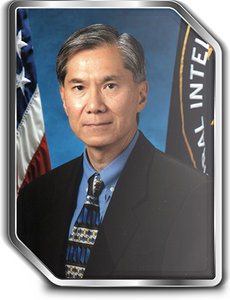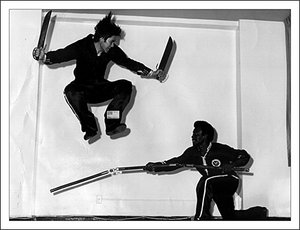Bill: Please share with me a little about your childhood in New York.
Hon: It was fun. Growing up in New York's Chinatown was like living in a Chinese village that had been transplanted to a five square block area in southern Manhattan.
Bill: What's your martial arts background?
Hon: When I was a kid, my uncle claimed he knew kung fu. He showed me how to punch and kick and made me stand in a low crouch called a horse stance until my thighs burned and my whole body ached. But, I didn't take him or my lessons seriously because he didn't look like my cinema kung fu heroes. It wasn't until I got into high school that I took formal lessons, but in Japanese karate, not Chinese kung fu. The classes in karate seemed better organized than what I found in Chinatown. I continued training in the Marine Corps, but it wasn't until I moved to Washington D.C. that I returned to my Chinese roots to study kung fu. This was before anyone had heard of Bruce Lee and people thought kung fu was something you ate at a Chinese restaurant.
Bill: What were some of the highlights of your Vietnam service as a Marine?
 Hon: Combat was a transformative experience. The man I replaced and the man who replaced me were both killed in action. So many of the men I had served with came home broken, physically or emotionally. I'm glad that today's veterans are returning to a warmer welcome than the hostile reception Vietnam vets received. But I feel we have to go beyond just saying, "thank you for your service." A 2008 RAND Corporation study concluded that 31% of veterans returning from Iraq and Afghanistan suffered from PTSD, depression or traumatic brain injury. That's why I appreciate the work so many in our acupuncture community are doing to help veterans, and I applaud the Acupuncture Without Borders "Military Stress Recovery Project," and similar initiatives.
Hon: Combat was a transformative experience. The man I replaced and the man who replaced me were both killed in action. So many of the men I had served with came home broken, physically or emotionally. I'm glad that today's veterans are returning to a warmer welcome than the hostile reception Vietnam vets received. But I feel we have to go beyond just saying, "thank you for your service." A 2008 RAND Corporation study concluded that 31% of veterans returning from Iraq and Afghanistan suffered from PTSD, depression or traumatic brain injury. That's why I appreciate the work so many in our acupuncture community are doing to help veterans, and I applaud the Acupuncture Without Borders "Military Stress Recovery Project," and similar initiatives.
Bill: What drew you into working with the CIA?
Hon: Military service whetted my appetite for travel and adventure. After the exhilaration of combat, I wasn't ready to settle down to a routine 9-to-5 job. And who could resist playing James Bond? Having witnessed the futility of war and the strategic myopia that got our country entangled in the so-called Vietnam quagmire, I had hoped that by joining the CIA I could help provide U.S. policy makers with the intelligence they'd need to avoid the future squandering of our national blood and treasure. Unfortunately, good intelligence doesn't always translate into good policy.
Bill: Can you tell me of any "close calls" you've had during your tenure with the company?
Hon: What you see on screen is a distorted picture of the CIA. I was a case officer. Unlike Tom Cruise, unless it's a war zone or hostile environment, CIA officers don't go around shooting bad guys. The agents I handled, who put their lives or careers on the line, were the ones at risk. I was never in mortal danger while on the job. The only close call was during a burglary, when I had a knife pressed against my throat. But that could have happened anywhere.
Bill: What were the circumstances surrounding your pursuit of Chinese Medicine?
Hon: When I was a kid, I got so sick my mother took me to the Chinese herbalist down the street and made me gulp down bowls of foul tasting decoctions that restored my health. It was like magic, something I knew i had to learn. Also, the founders of my martial arts systems were Chinese medicine physicians. I'd inherited a manual of "secret" formulas, so I felt obligated to learn enough so I could use them responsibly. Moreover, according to Chinese martial arts ethics, if you know how hurt someone, you should also know how to heal them.
Bill: Have you had any qigong exposure? If so, what style(s)?
 It wasn't until I got into high school that I began to take formal lessons.
Hon: I'd practiced qigong as part of kung fu training to develop internal power and as a form of self-cultivation. It wasn't until I took a required qigong class in acupuncture school that I discovered that it's a pillar of classical Chinese medicine and can be used to heal people. Since then, I've learned several styles and completed a three-year program in Medical Qigong Therapy. I personally practice and teach Spring Forest Qigong, created by Chunyi Lin, whose vision is: "A healer in every family and a world without pain." I recommend it to all my patients as a way to heal physically, emotionally and spiritually. What I like most about this particular style is that it's profoundly powerful yet very simple to learn. If it's not simple, my patients won't do it consistently (if they do it at all).
It wasn't until I got into high school that I began to take formal lessons.
Hon: I'd practiced qigong as part of kung fu training to develop internal power and as a form of self-cultivation. It wasn't until I took a required qigong class in acupuncture school that I discovered that it's a pillar of classical Chinese medicine and can be used to heal people. Since then, I've learned several styles and completed a three-year program in Medical Qigong Therapy. I personally practice and teach Spring Forest Qigong, created by Chunyi Lin, whose vision is: "A healer in every family and a world without pain." I recommend it to all my patients as a way to heal physically, emotionally and spiritually. What I like most about this particular style is that it's profoundly powerful yet very simple to learn. If it's not simple, my patients won't do it consistently (if they do it at all).
Bill: What skills in your previous careers have come in handy as a Licensed Acupuncturist?
Hon: I think good people skills, i.e., our ability to communicate and build rapport with others, are essential in being successful in any profession. It's a set of skills I tried to develop to be a more effective military commander, CIA manager and martial arts instructor and that I continue to hone as an acupuncturist. In treating patients, especially those with chronic illnesses, I'm more effective if I can change mental, emotional or spiritual patterns that may be at the heart of their problems. And to effect change requires gaining their trust and confidence.
Bill: What do you like most about being an acupuncturist?
Hon: I just published my memoir describing the seemingly divergent paths I travelled that finally lead to fulfilling my boyhood dream of practicing Chinese medicine. Along the way, I discovered that my true purpose in life is to serve others. Being an acupuncturist provides me the tools to do just that, to help people lead stronger, happier and healthier lives.
Bill: Any parting thoughts for our readers?
Hon: Albert Schweitzer said, "I don't know what your destiny will be, but one thing I know: the only ones among you who will be really happy are those who will have sought and found how to serve." I know my fellow acupuncturists feel the same way. That's why it's such privilege to work with and learn from a community of like-minded people who are passionate about helping others.
Hon Lee is the owner of the Sports Edge Acupuncture clinic and the author of Paths Less Travelled of a Scholar Warrior (Spy) Teacher Healer. He is on the faculty of the Virginia University of Oriental Medicine and is involved with the Virginia Center for Reproductive Medicine.



